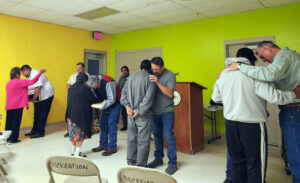
WASHINGTON (BP)–The fight over the confirmation of President Bush’s embattled judicial nominees has escalated.
On Feb. 14, the White House resubmitted seven of the president’s federal appeals court nominees who were filibustered by Democrats in his first term. That action came on the same day the Senate’s majority leader was quoted in a published interview as saying he had the votes to change a rule and prohibit filibusters of judicial selections.
Sen. Bill Frist, the Republican leader from Tennessee, told The Washington Times he was confident he had a majority necessary to uphold a rule change that apparently would provide the means for Bush’s nominees to be confirmed.
Democrats have labeled such a rule change the “nuclear option,” but Frist told The Times it was a “constitutional option.”
“The nuclear option is what they did to me last year when they changed the precedent,” he said. “[W]e need to restore the over 200-year tradition and precedent of allowing every nominee of the president who has majority support an up-or-down vote on the floor of the United States Senate.”
Frist said, however, he does not know if he will call for the rule change the first time Democrats filibuster a nominee.
“[T]he specific decision [on when to call for a vote for the rule change] has not been made” Frist said. “I’ve got some pretty clear alternatives to use and, again, I’ll just continue to appeal to the other side to be reasonable.”
Chances for a Democratic embrace of Frist’s appeal did not appear promising after Bush resubmitted the seven filibustered nominees.
Sen. Edward Kennedy, D.-Mass., said in a written statement Bush “looks like he is still more interested in picking fights than picking judges.”
Senate Minority Leader Harry Reid of Nevada said in a written release, “The president is at it again with the extremist judges. We should not divert attention from other pressing issues facing this nation to re-debate the merits of nominees already found too extreme by this chamber.”
Pro-life and pro-family leaders, however, welcomed the developments and urged Frist to move forward with a rule change if needed.
Richard Land, president of the Southern Baptist Ethics & Religious Liberty Commission, applauded Frist’s “courageous leadership in seeking to bring an end to this nefarious and unprecedented obstructionism.”
“One of the responsibilities of the president is to nominate federal judges, and he has the right to nominate judges in keeping with his judicial philosophy,” Land told Baptist Press. “Senators have a right to advise and then vote either for or against a particular nominee. They do not have a constitutional right to keep the Senate from voting. That is clearly contrary to the intent of the Constitution and is by definition unconstitutional. [I]t is well past time for it to stop.
“The constitutional requirement is to have a positive vote of a majority of senators, not a supermajority of 60 votes required to break a filibuster,” he said.
Frist “shouldn’t hesitate” to change the filibuster rule, said Jan LaRue, Concerned Women for America’s chief counsel, in a written release. “There’s only one reason the minority obstructionists are employing the filibuster, and that’s because they know they will lose if they permit the majority of senators who want to vote to vote. That’s the nuclear option that needs to stop.”
The Democrats successfully filibustered 10 federal appeals court nominees in Bush’s first term, and the president re-nominated the seven who remained as candidates for the posts. Sixty votes are needed to invoke cloture, which ends a filibuster. Though the filibustered nominees received a majority of votes and would have been confirmed on the Senate floor, they did not gain the 60 votes for cloture.
The Republicans had only a 51-member majority before the November election, in which they gained four seats. Frist’s comments apparently mean he still will have enough votes to achieve the 51 needed after a few of the 55 Republicans refuse to support a rule change.
In a Jan. 4 speech upon the opening of the 109th Congress, Frist said it had been suggested he present the rule change as the Senate began its new session. Frist said he had chosen not to do so “in the spirit of bipartisanship,” although he said he reserved the right to offer the revision.
“But, if my Democratic colleagues continue to filibuster judicial nominees, the Senate will face this choice — fail to do its constitutional duty or reform itself, restore its traditions and do what the Framers intended,” Frist said then.
Among the seven filibustered nominees resubmitted by Bush were Janice Rogers Brown to the District of Columbia Circuit Court of Appeals, Priscilla Owen to the Fifth Circuit and William Pryor to the 11th Circuit. According to CWA, two others who were re-nominated by Bush were voted out of the Judiciary Committee and threatened with filibusters in his first term.
Bush sent 20 nominees for federal judgeships to the Senate Feb. 14. Of these, 12 were for appeals courts. The list of federal and additional presidential nominees may be accessed at http://www.whitehouse.gov/news/releases/2005/02/20050214-7.html.
–30–
















